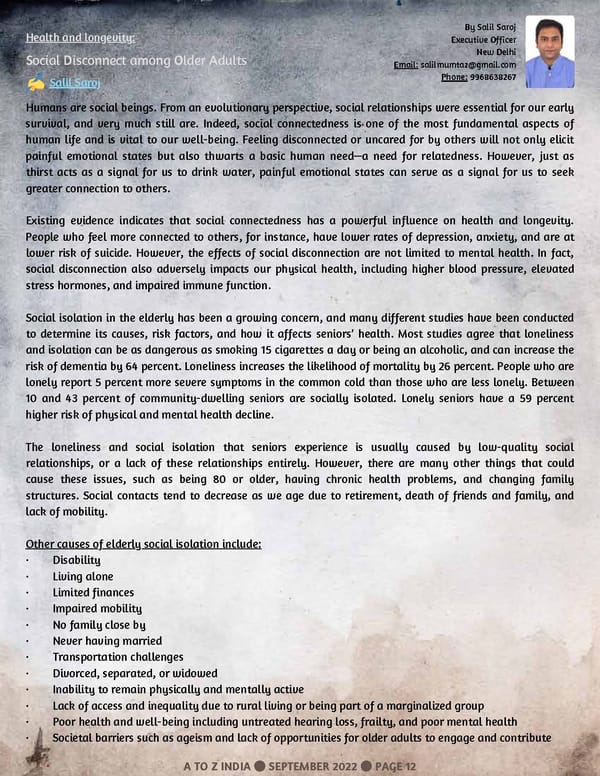Humans are social beings. From an evolutionary perspective, social relationships were essential for our early survival, and very much still are. Indeed, social connectedness is one of the most fundamental aspects of human life and is vital to our well-being. Feeling disconnected or uncared for by others will not only elicit painful emotional states but also thwarts a basic human need—a need for relat edness. However, just as thirst acts as a signal for us to drink water, painful emotional states can serve as a signal for us to seek greater connection to others. Existing evidence indicates that social connectedness has a powerful influence on health and longevity. People who feel more connected to others, for instance, have lower rates of depression, anxiety, and are at lower risk of suicide. Howev er, the effects of social disconnection are not limited to mental health. In fact, social disconnection also adversely impacts our physical health, including higher blood pressure, elevated stress hormones, and impaired immune function. Social isolation in the elderly has been a growing concern, and many different studies have been conducted to determine its causes, risk factors, and how it affects s eniors’ health. Most studies agree that loneliness and isolation can be as dangerous as smoking 15 cigarettes a day or being an alcoholic, and can increase the risk of dementia by 64 percent. Loneliness increases the likelihood of mortality by 26 percent. People who are lonely report 5 percent more severe symptoms in the common cold than those who are less lonely. Between 10 and 43 percent of communit y-dwelling seniors are socially isolated. Lonely seniors have a 59 percent higher risk of physical and mental health decline. The loneliness and social isolation that seniors experience is usually caused by low-quality social relationships, or a lack of these relationships entirely. However, there are many other things that could cause these issues, such as being 80 or older, having chronic health pr oblems, and changing family structures. Social contacts tend to decrease as we age due to retirement, death of friends and family, and lack of mobility. Other causes of elderly social isolation include: · Disability · Living alone · Limited finances · Impaired mobility · No family close by · Never having married · Transportation challenges · Divorced, separated, or widowed · Inability to remain physically and mentally active · Lack of access and inequality due to rural living or being par t of a marginalized group · Poor health and well-being including untreated hearing loss, frailty, and poor mental health · Societal barriers such as ageism and lack of opportunities for older adults to engage and contribute Salil Saroj Social Disconnect among Older Adults Health and longevity: A TO Z INDIA SEPTEMBER 2022 PAGE 12 By Salil Saroj Executive O fficer New Delhi Em ail: salilm um taz@ gm ail.com Phone: 9968638267
 A TO Z INDIA - SEPTEMBER 2022 Page 11 Page 13
A TO Z INDIA - SEPTEMBER 2022 Page 11 Page 13